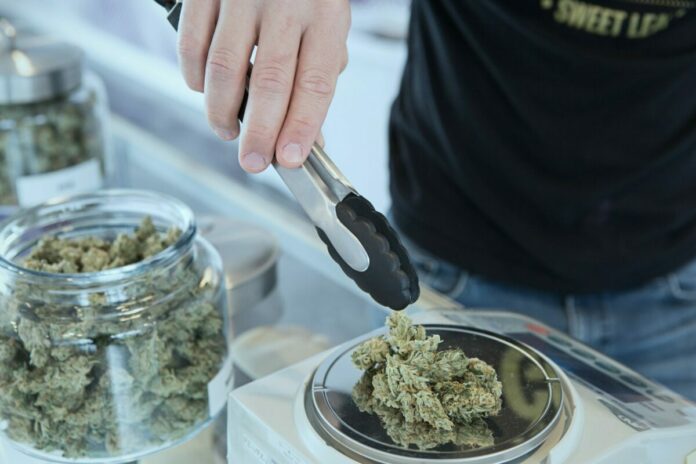Update: The Federal Government has announced that it will issue pardons for those who have been convicted of cannabis possession on a federal level. The city is also started to distribute licenses at a faster rate.
Cannabis laws, specifically marijuana, has completely destroyed the lives of individuals, dating back to the war on drugs during the Richard Nixon era. What was proposed as a necessary path to eliminating drug use in America, quickly shifted into an inequitable attack on minorities that has spanned decades. Disproportionately hurting minorities and those with lower socio-economic backgrounds, only now are we beginning to correct some of those wrongs, including New York’s equitable approach to legalizing marijuana.
Background: The War on Drugs and the Present
The war on drugs was designed to harm specific groups as one top Nixon aid confirmed the targeting of certain groups, saying in a 1994 interview published in 2016, “we knew we couldn’t make it illegal to be either against the war or black, but by getting the public to associate the hippies with marijuana and blacks with heroin, and then criminalizing both heavily, we could disrupt those communities. We could arrest their leaders, raid their homes, break up their meetings, and vilify them night after night on the evening news. Did we know we were lying about the drugs? Of course, we did.”
The path to remedy comes in many shapes: decriminalizing cannabis, overturning prior convictions, condemning the war on drugs, but the reality is, it’s impossible to correct all of the wrongs. There is no way to give back lost years of life. There is no way to repair broken homes, families, and so on. Even recent promises are behind in so many places, including the sweeping pardoning outlined in Joe Biden’s campaigning. As one person wrote when telling their story of how cannabis prohibition ruined his life via a 60-month sentencing, since taking office, “[Joe Biden] has pardoned two turkeys – and no people.”
Similar promises have come from Senator Chuck Schumer, who said in 2020, “I am going to do everything I can to end the federal prohibition on marijuana” in a rallying cry for Democrats to take back the Senate. Both, if not all, promises at the federal level have fallen flat, leaving many to wonder when relief will come, if ever. Some states and cities have since come up with ways to address the problem in their localities, pushing for legalization or policies that create equitable conditions in the aftermath of legalization.
New York’s Promise
New York, following similar policies outlined in other progressive areas and its recent legalization of marijuana use in the state, has opted to give selling permits to those with prior convictions first. While other equitable moves have been made in the country, none as bold and defined as limiting first dibs on licenses to those affected by prior convictions. The move is a direct attempt at writing wrongs of the last few decades, but it leaves many wondering, is it enough?
If properly implemented, reserving first sales licenses for New Yorkers with previous convictions will directly reverse some wrongs for some citizens, but there are a finite number of licenses available compared to the thousands of citizens with former convictions. Where do the people without the funds for a startup, business experience, or those that don’t receive a license fit into the solution? Do they simply benefit from decriminalized use? While this may be a step in the right direction to help some, it’s not necessarily an all-out rectification. There are simply not enough licenses to go around. It also raises another important question of what happens to entrepreneurs who have already made their mark in the state, specifically New York City, following legalization.
What About Those Already Selling in Limbo?
Since being decriminalized in March of 2021, the process for an official and licensed rollout of marijuana sales has not been off to the best start. No licenses have been delved out yet. Only now is that beginning to happen, a year later, which left room for a thriving decriminalized, but not totally legal, marijuana market in the city.
This means that those that are currently selling without licensing are getting a head start on a soon-to-be multi-billion-dollar business in New York. The slow rollout makes some wonder whether receiving an official license from the state, launching a business, and gaining momentum now will ever stand a chance to the already established businesses that have been selling since legalization last year. Thus, the impeding licenses have seemingly lost a chunk of their value because many, even peers that have also suffered at the hands of the war on drugs, have beat new licensees to the punch in creating successful businesses prior to licensing.
What About Those Without Business Experience?
One requirement for license eligibility is that a person has a proven track record of at least two years with a profitable business. If someone is newly released or still reeling from their life being broken apart due to the war on drugs, how can they capitalize on this new project?
It makes sense that the state would only want to back up profitable businesses as their revenue and name would be on the line too, but in the same stroke, it completely limits licensure to those that were able to thrive following conviction. This further drives the division between licensed and unlicensed sellers as the reality is many won’t be eligible. Not anytime soon, at least, and not for the first batch of licenses. Furthermore, there are limits on the types of crimes and the timeline of crimes too as the bill outlines that those convicted of certain felonies within a 3 year time period to licensure may not be eligible for licensure, as outlined on page 26 of the bill’s text.
Will Citizens Want to Purchase from Legal Sites?
On the other hand, if the state managed to publicly shut down all of the unlicensed dealers, including trucks, folding table entrepreneurs, and brick-and-mortars, there is still no guarantee that citizens will want to purchase from the government-sponsored stores because they often have high taxes and higher overall costs for operation.
Massachusetts adopted a similar equitable policy that left many still wanting to purchase and sell under the table due to the ridiculously high prices for the product. Because it’s legal either way, some may not see the benefit of purchasing through the state. If it strictly came down to a consumer’s affordability, legal businesses may be skipped for a cheaper option, providing little benefit for those operating with licenses anyway.
That’s not to say that one or the other is more deserving of being able to sell, but that the state, in its delay, has created a new layer of trouble. It’s created a competition between licensed and unlicensed business operations, with one side having a hearty head start and much success.
What Happens to Unlicensed Marijuana Businesses?
In forcing already operating and established unlicensed businesses to close down operations to make room for newly licensed businesses, there will likely be a new wave of condemnation. While some of these businesses may receive a license and be able to operate completely above-board, there is no guarantee and not a universal want.
In addition to there being no guarantee that already operating businesses will receive a license, despite already operating successfully, they may also not receive one, perhaps in spite of it. Some, holding true to the idea of entrepreneurship, have taken the business into their own hands and built successful brands without the help of the state and with no intent of help from the state.
One prolific business, The Green Truck, aka Uncle Budd, has commented on their business operations despite being unlicensed, saying, “we’re actually going to the people that were hurt by the marijuana laws, and we’re trying to bring them into the industry based on our understanding of the guidance that’s being offered today from the state.”
The state has begun to send cease and desist letters to unauthorized sellers. Businesses attempt to skirt past the requirements by the state for licensure, instead having consumers pay for memberships, not the cannabis products themselves. One popular shop in Chelsea, Empire Cannabis Club, owned by the Elfland family, has taken on this business model, and despite the state telling them to quit, they maintain that their membership model keeps everything legal.
Businesses like Empire hopes to secure a license when available, but they refuse to sit by and let others, such as already licensed medical marijuana sellers, overtake the market in the meantime. Regardless of what the state says, they have no plans of stopping their business and plan to continue expanding it instead. For the family, it would be nice to have the license, but it’s not a requirement on their path for redemption in righting all the wrongs of the past, especially in their own family.
New York’s Hopes for the Future
The guidelines as of now are that of the first 100-200 licenses, priority will go to a business with operators who were formerly convicted or to a person whose immediate family was incarcerated for marijuana-related crimes. The program is honorable but presents many potential problems as rollout begins and the state grows accustomed to a legal market.
As Governor Kathy Hochul says, “New York State is making history, launching a first-of-its-kind approach to the cannabis industry that takes a major step forward in righting the wrongs of the past… I’m proud New York will be a national model for the safe, equitable, and inclusive industry we are now building.”
The hope is that the initiative set forth by New York officials will do just that, but there is a risk of leaving behind others, even those with already recognizable businesses growing in the city. In an ideal world, those that have made the most of 2021’s legalization will be able to receive licensing and operate under fair guidelines that are not too different from their current operations.
While this seems unlikely with potential profitability for the state and subsequent interference, it’s unclear how the state will manage to limit leaving behind those that matter the most. While the state hopes to pioneer an equitable legalization method, the process will also involve carefully navigating the fallout as well.
For more information on eligibility and restrictions, visit New York Senate Bill S854A.
Kylee was born and raised just outside of Sacramento in a small town full of history and charm. She stays up-to-date on the real estate market and hopes to empower hopeful buyers and sellers to make the best decisions for themselves. Kylee is particularly interested in bridging the gap for younger generations, helping them understand the power of owning and investing in real estate.



